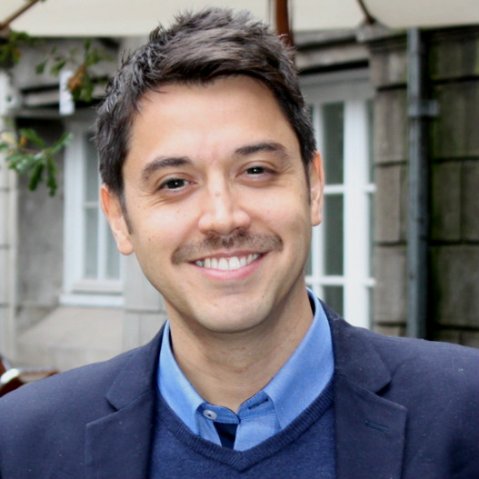SPAA Doctoral Student Javier Fuenzalida Incorporates International Perspectives into Career

Before starting his PhD program at Rutgers School of Public Affairs and Administration (SPAA) in 2013, Javier Fuenzalida had never been to the United States.
“My wife, Andrea, and I moved from Chile to a totally different country,” he said. “It was our first time living abroad and it was for four years.”
Fuenzalida was drawn to the program after a rigorous search of public administration professors led him to SPAA’s faculty. He read papers and books by Drs. Gregg Van Ryzin, Norma Riccucci, Marc Holzer, and Frank Thompson, and wanted the opportunity to work with them.
Through a Fulbright scholarship, Fuenzalida received assistance with the application process, a stipend for books, and visa sponsorship for him and his wife to stay in the United States during his studies. In tandem with the Fulbright, he also received a government-sponsored Becas Chile Scholarship that covered tuition and living expenses.
Fuenzalida’s scholarships heightened his awareness of his responsibilities and expectations. He said he felt a looming pressure that didn’t begin to dissipate until his third year in the program when newfound confidence and opportunities allowed him to finally enjoy his academic pursuits.
“The first two years were so stressful with regard to improving not only my English, but my academic writing and presentations, working with professors, keeping my scholarships, and generally trying to excel,” Fuenzalida said.
“Working with Javier was always such a pleasure because he is very focused and has outstanding research skills,” said Riccucci, Fuenzalida’s doctoral advisor. “I actually learned a great deal from him as well because he has an immense amount of knowledge about how public organizations operate in Latin America.”
Fuenzalida began teaching statistics and research methods courses in his third year, and said the experience of interacting with the master’s students and learning about their research provided fresh perspectives and a positive experience.
In addition to teaching, Fuenzalida became the assistant director of the National Center for Public Performance (NCPP), an entity formerly housed at SPAA under the direction of Dean Emeritus Dr. Marc Holzer. The center focuses on improving productivity in the public sector through the study and promotion of performance measurement initiatives. Despite the enormity of his role, Fuenzalida said that he and NCPP Director Andrew Ballard were strongly supported by Holzer, who gave them the autonomy to pursue creative initiatives for the center.
In his role as a student, Fuenzalida credits several professors with helping him to absorb the material, serving as role models, and building a confidence that had previously been smothered by anxiety.
“Frank Thompson is perhaps the best professor that I’ve ever had in my life,” Fuenzalida said. “Every lecture he gave was a masterpiece and when I teach my courses, I try to copy him. He really pushed us to think critically.”
He said Thompson spurred his interest in researching “politicization,” or the influence of politics in public administration – a topic that he would eventually select for his dissertation. In early 2017, Fuenzalida published an Inter-American Development Bank’s article on the subject titled “Meritocracy in the Selection of Public Officials and its Effects on Organizational Performance: Results of an Exploratory Study in Latin America.”
After four years in the United States, Fuenzalida moved back to his home country in May 2017 to work for the University of Chile as a research associate and professor for the industrial engineering department. His responsibilities include teaching, conducting research, and assisting the Chilean government and other Latin American governments in advancing public sector management.
While balancing a full-time position, Fuenzalida continues to work on his doctoral dissertation which will discuss the effects of politicization in Chile and Peru as they relate to merit systems for public officials. In studying these effects, he is examining case studies and conducting experiments in those countries.
Fuenzalida expects to complete his research in 2018, and looks forward to the day when he will return to the United States to successfully defend his dissertation and join the ranks of SPAA’s doctoral alumni.
